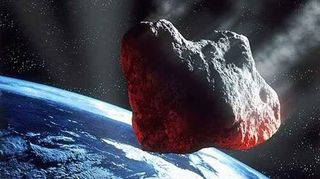Humans Have the Most Urgent Need for a Continuous Supply of
Can Human Civilization Continue Indefinitely?

SAN FRANCISCO — Human beings have altered the Earth so much that human extinction is a real possibility if people continue on their current path. But if they can figure out a way to live sustainably, at least some human civilizations could become quasi-immortal, one researcher says.
The challenge is to change the societal outlook to one that is long-term and accounts for humanity's central role in shaping the planet's destiny, instead of one that reacts to immediate crises and thinks in the short term.
"For our civilization to become a new kind of entity on the planet, we need to live comfortably, over the long haul, with world-changing technology," David H. Grinspoon, an astrobiologist at the Library of Congress, said Dec. 12 here at the annual meeting of the American Geophysical Union.
Not everyone agrees that a long-term perspective is possible or that it will prevent Earth's demise. In fact, one astronomer said humans are hardwired to live in the world of the "immediate." [Doomsday: 9 Real Ways Earth Could End]
Human era
For most of the last 4.5 billion years, Earth has been shaped by natural disasters, such as the dinosaur-killing asteroid, or biological forces, such as the rise of cyanobacteria that created the planet's oxygen-rich atmosphere, Grinspoon said.
But in the current epoch, humans are fundamentally altering the planet.
"The Earth is becoming unrecognizable from the planet it was before we became a geological force," a period that some have dubbed the Anthropocene Era, Grinspoon said.
Habitat destruction, unchecked population growth, global warming and other challenges of modern civilization have put humanity at risk. The problem is that right now, though humans have a large unintentional impact on the planet, they don't consciously control that impact, he said.
Civilizational crossroads
Now, civilization is at a crossroads, Grinspoon says: If global warming and other Earth-altering phenomena continue unchecked, humanity could die out. But, if Homo sapiens can overcome those challenges, the people who do survive could build a longer-lived civilization than any that thrived in the past. In essence, at a bifurcation in history, civilizations could be capped at a few thousand years or, alternatively, last for hundreds of thousands — or even millions — of years.
"If even a small fraction of people come through the bifurcation in lifetime of civilizations, then they may become quasi-immortal," he said.
The good news, Grinspoon said, is that humans are now trying to shape the planet's future. For instance, nations consciously took political action to shrink the ozone hole, are working to curb carbon emissions and are looking for ways to prevent asteroids from bombarding Earth.
In the future, societies could learn to geoengineer their environment, prevent future Ice Ages, or even (in the distant future) stave off Earth's end, when the sun balloons into a red giant and engulfs the planet in scorching heat, Grinspoon said.
Central players
In order for humanity to have any hope for survival, however, it must learn to harness technology wisely, Grinspoon said. Humanity must also shift from its short-term, regional outlook that denies humans' impact on the Earth to a multigenerational and global outlook that consciously accepts its crucial role in Earth's fate. [Big Bang to Civilization: 10 Amazing Origin Events]
That outlook may be disturbing for many people, including scientists accustomed to seeing humans as inconsequential specks in the vast story of the universe, and environmentalists who liken humanity to criminal interlopers guilty of destroying the Earth, Grinspoon said.
But Grinspoon argued that those views of humanity are counterproductive, because they make humanity's problems seem intractable.
"We are central to the story," Grinspoon said.
Instead, a better metaphor may be people who somehow awoke at the helm of a very large bus speeding down the highway, he said. "We have to figure out how to drive this thing to avoid the catastrophe," he said.
Civilization is facing a bottleneck, said Seth Shostak, a senior astronomer with the SETI Institute in Mountain View, Calif.
"Eventually, you either have to stabilize the population and reuse everything, or you have to do something else," such as go into space to live or mine for resources.
But Shostak questioned whether a more global, long-term outlook is reasonable to expect.
"The way we're wired is to be worried about the immediate problems," Shostak told LiveScience.
And it's not always possible to have a long-term perspective. For instance, London was engulfed in a miasma of toxic fumes from coal-fired home heating in the 1870s, and nobody could come up with a solution. Then, coal-fired heating gave way to other heat sources, and the problem solved itself, he said.
"You don't often see what's right around the corner," Shostak said.
Follow Tia Ghose on Twitter and Google+ . Follow us @livescience , Facebook & Google+ . Original article on LiveScience.
allensheacheept1961.blogspot.com
Source: https://www.livescience.com/42106-could-humans-become-immortal.html
0 Response to "Humans Have the Most Urgent Need for a Continuous Supply of"
Post a Comment